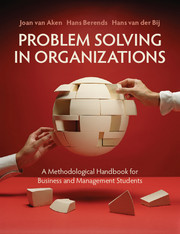12 - Searching and using scholarly literature
from Part III - Methods
Summary
Introduction
No two field problem solving projects are identical. At the same time, no business problem is completely different from all other business problems. Given the long history of management research, it is likely that problems that are comparable to a specific new business problem have been studied already. As we have explained, FPS projects benefit from the use of this existing scholarly literature. Although the literature will not provide all the answers, it can inform each of the steps of a problem solving project. In this chapter we are concerned with the search and use of existing scientific knowledge.
There is a widely shared concern that existing knowledge within the field of management science (and within other fields) is insufficiently used by practitioners (van Aken, 2004). One reason for this lies in the organization of knowledge. The management science literature is fragmented and contested (Whitley, 1984; Tranfield, Denyer and Smart, 2003): it is fragmented in that relevant ideas and research findings are often scattered across different journals and fields of study, presented in different terms and show little accumulation; it is contested in that studies that address comparable questions often yield contradictory results. Conflicting opinions coexist – sometimes in mutual ignorance – and disputes often remain unresolved.
- Type
- Chapter
- Information
- Problem Solving in OrganizationsA Methodological Handbook for Business and Management Students, pp. 188 - 200Publisher: Cambridge University PressPrint publication year: 2012



